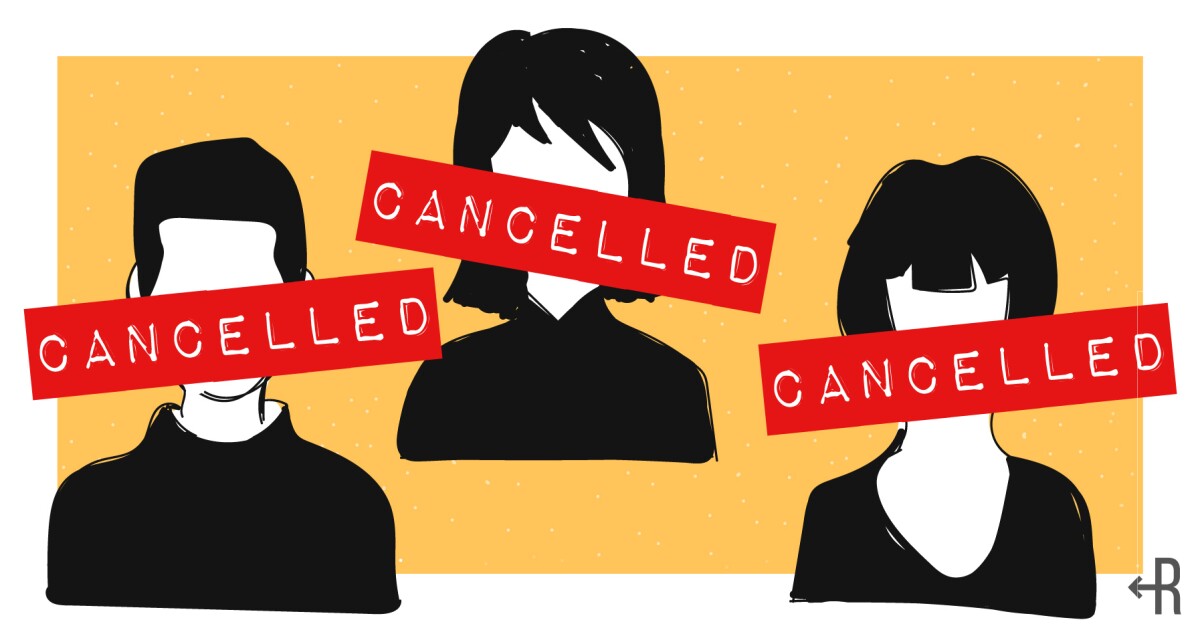
Cancelled!
When Cancel Culture Hits Home
If you find yourself estranged from your adult son or daughter, you may be a victim of cancel culture.
Cancel culture is a current craze that causes masses of people to withdraw support for public figures who are perceived to have said or done something offensive. Cancel culture thrives in the realm of digital media where a single statement or photograph can ignite a firestorm of angry responses designed to “cancel” the offending individual from public life. This pervasive mindset has swept across America, stoking the fires of indignant, offended people who feel the need to disparage, post, tweet, and retweet every incident of bad behavior that appears on their newsfeed. The web of cancel culture seems to snag at least three public figures a week, lighting up the digital landscape like the Las Vegas Strip on New Year’s Eve.
Now I’m all for calling people out on their despicable behavior, especially individuals in positions of public trust—provided such allegations are true. Unfortunately, many people have been caught in the web of cancel culture based on limited or completely false information. The Urban Dictionary[i] (which I like a lot) aptly says, “It is caused by a critical mass of people who are quick to judge and slow to question. It is commonly caused by an accusation, whether that accusation has merit or not.”
Cancel culture is fueled by the public’s insatiable desire to identify, judge, and discard other humans, and it spreads with lightening speed. And then folks just re-tweet and move on.
The practice of cancel culture has become so insidious that most of us just yawn, scratch our heads, and scroll on. But what do we do when this mindset seeps into our personal relationships?
In a recent Op Ed piece in the Los Angeles Times, psychoanalyst Galit Atlas PhD states that the increasing practice of “canceling” your parents is an extension of this larger societal trend. And while cancel culture can be effective in exposing injustice and creating positive social change, estrangement takes a steep toll on both sides of the divide. She concludes that “this is a self-help trend that creates much harm.” [ii]
Although parents often carry the brunt of relational heartache, it’s important to realize that estrangement is also detrimental to the adult children who cancel their parents. Even if they are the architects of their own departure, adult children are not exempt from the damaging effects of estrangement. Atlas states it like this:
The catch is that after estrangement, adult children are not suddenly less dependent. In fact, they feel abandoned and betrayed, because in the unconscious, it doesn’t matter who is doing the leaving; the feeling that lingers is one of “being left.” They carry the ghosts of their childhood, confronting the emotional reality that those who raised us can never truly be left behind, no matter how hard we try. They live inside us, even without our permission. This is something that can never be canceled.
Young adults who swallowed the poison of cancel culture and abandoned their parents are also experiencing their own form of relational suffering.
Canceling your parents is not the same as ending your Netflix subscription or refusing to patronize a business that runs sweatshops filled with underage children in Southeast Asia. There is so much more at stake.
I’m painfully aware of what it’s like to carry a young, wounded version of myself into adulthood. I wrote about this experience in great detail in my memoir She’s Still In There: Healing the Wounded Child Within. Despite the adversities of my past, I maintained a fairly close relationship with my mom until she passed away from cancer. It wasn’t until my life unraveled in my mid-forties that I found deep spiritual healing and a lasting resolution for the wounds I endured when I was very young.
If estrangement creates a similar sense of haunting abandonment, if adult children can never completely erase their parents from their hearts, I wonder if its possible for these fractured relationships to heal. And then I wonder if our estranged kids might miss us, even if its only once in a great while. This thought opens a tiny ray of hope.
So for all you parents who think your estranged children never give you a moments’ thought, or if they do, it can’t be a good thought, take heart. That mom or dad who loves them still lives, however quietly, within the soft folds of your child’s memory.
I have learned to accept the reality that I am unable to close the vast distance that separates me from my estranged daughter. That ship sailed and is a long way out to sea. But I can still be a lighthouse on the shore, and if her journey ever gets too lonely or too rough, I can still flash a beacon of hope.
[i] Urban Dictionary: Cancel Culture in https://www.urbandictionary.com/define.php?term=Cancel%20Culture 3/28/2022
[ii] Op-Ed: 1 in 4 adults are estranged from family and paying a psychological price; Los Angeles Times November 28, 2021. Atlas, Galit.https://www.latimes.com/opinion/story/2021-11-28/1-in-4-adults-is-estranged-from-family-and-paying-a-psychological-price


Very well written. Sorry for your heart’s ache and I hope the ship will sail back home to you one day.
Hit me right where it hurts. I have a grown granddaughter (my oldest daughter’s child) who has “canceled” my entire side of the family. I pray daily for her rescue from her spiritual battlefield.
Wow. So sad and unnecessary… thanks for sharing your truth in this well-written piece.
Your comments on this subject are awesome! You touched on a subject that is on the minds of many adults. Many thanks for your blog this morning and I hope your daughter will answer to the beams of your lighthouse. Love you, Dad
Thank you for your interesting article and for sharing your insights. After 5 years without my daughter I’ve reached the “acceptance” phase of losing her. I just wish I could get past the feeling of hopelessness deep in my heart.
Lisa, thank you for such an articulate reminder that our children cannot leave us behind. My daughter has been estranged for nearly three years, and our son for one year.
I worry …I made my son leave as we were arguing and he was tearing up my house and being violent. He was 24. He’s now 28 and he still won’t talk to me. I’ve reached out. I’ve apologized for my parental failure and mistakes. Even when things were the toughest …I told him I loved him. I believe he knows I do. I want to have hope that through maturing he will self reflect and understand that even though I wasn’t a perfect mom …I am his mom and I love him.
Your love for your son is a powerful force that leaves your heart open to such pain when you are rejected. Keep your heart open to God’s grace and allow him to begin to heal your brokenness. And reach out to others who are going through this same kind of pain. There are people who will walk alongside you who are experiencing similar abandonment and loss. Praying for you.